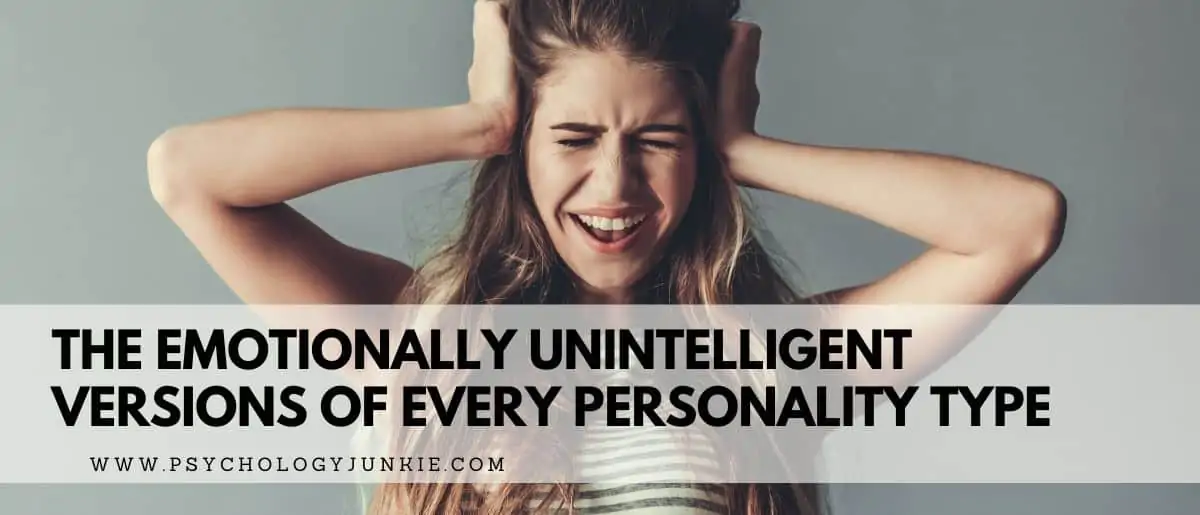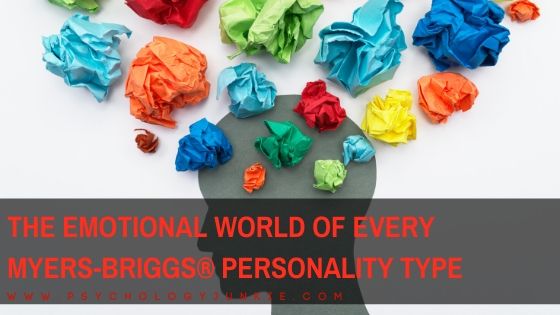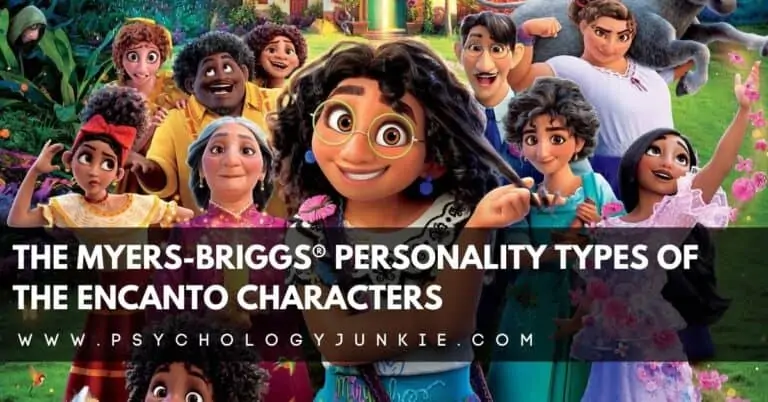The Emotionally Unintelligent Versions of Every Personality Type
Last week we explored what the emotionally intelligent versions of every personality type are like. As I said before, any of the 16 Myers-Briggs® personality types can be emotionally intelligent. In the same way, any of the 16 types can be emotionally unintelligent. That’s what we’re going to be looking at today.
Not sure what your personality type is? Take our new personality questionnaire here. Or you can take the official MBTI® here.

Table of contents
Estimated reading time: 20 minutes
What Is Emotional Intelligence?
Before we look at emotional unhealthiness, let’s take a look at what emotional intelligence is in the first place. The term “emotional intelligence” was coined in the 1990s, then popularized by psychologist and author Daniel Goldman in his book “Emotional Intelligence: Why It Can Matter More Than IQ.”
These are the 5 components of emotional intelligence that he referenced:
- Self-awareness
- Self-regulation
- Motivation
- Empathy
- Social Skills
PsychologyToday.com describes emotional intelligence as “the ability to identify and manage one’s own emotions, as well as the emotions of others.” The web site continues to state that “Emotional intelligence is generally said to include a few skills: namely emotional awareness, or the ability to identify and name one’s own emotions; the ability to harness those emotions and apply them to tasks like thinking and problem solving; and the ability to manage emotions, which includes both regulating one’s own emotions when necessary and helping others do the same.”
The Emotionally Unhealthy Versions of Every Myers-Briggs® Personality Type
The ENFP
When ENFPs are emotionally unintelligent, they have a hard time seeing things from other people’s points of view. While they can easily see many alternatives and possibilities, they seem to span out in countless different directions. As such, ENFPs have a hard time narrowing down what really is going on with another person or why they feel a certain way. It’s difficult for emotionally unintelligent ENFPs to empathize or think outside of their own experience. When they do detect other people’s feelings or motivations, it’s more of a means to an end than it is a way to help or support them. Their moods can overwhelm them, but they don’t take time to process these moods. Rather they act impulsively, cutting people off or finding distractions instead of dealing with the underlying emotions and the meanings behind them. They can seem distracted and may struggle to express themselves and their ideas.
Getting Emotionally Healthy:
For the ENFP, getting emotionally healthy often involves slowing down. Pausing. Reflecting. Letting everything stop for a minute. These are things that are vital. When ENFPs can slow down and put everything on pause they’re able to single out the emotions they’re feeling and dig deep into the truths and meanings behind those emotions. Journaling can be an effective way for them to understand themselves, and even understand others. Practicing meditation, deep breathing, and mindfulness techniques can help them to slow down and accurately sense what they’re feeling and why.
The ENTP
When ENTPs are emotionally unhealthy, they are out of touch with their own feelings and values. Focused on possibilities and ideas, they can be curious and innovative. But they may be blind to what they really want and venture down pathways that don’t ultimately make them happy or satisfy their needs. They can also be manipulative; using people as a means to an end rather than valuing their relationships. It’s often easy for ENTPs to sense how other people are feeling, but when they’re emotionally unhealthy they tend to use this to manipulate rather than to help. Thus they may say the wrong things at the wrong times or be unsympathetic or tactless without caring about how it affects anyone. They’re lack of awareness of their own values can make them start and stop multiple projects instead of finishing anything because they don’t know what they really want.
Getting Emotionally Healthy:
ENTPs become emotionally healthy when they tap into their Introverted Thinking side. It would seem strange to some that thinking could make one emotionally healthy, but it’s true. When ENTPs have healthy Introverted Thinking they can be radically honest with themselves and others. This radical honesty can help them to own up to their own mistakes, be honest, and discern what they really want in life. The more accurately they know themselves and others the more they can be insightful, fair, and grounded. When ENTPs pause, reflect, and think things through they become less hasty and restless and their actions become more strategic and intentional. Their feeling side also starts to develop and it becomes easier for them to empathize, put themselves in other shoes, and embrace their more generous side.
The INFP
When INFPs are emotionally unintelligent, they tend to get stuck in their own opinion and out of touch with alternatives, possibilities, or objectivity. It’s painfully difficult for them to accept criticism because they are so entrenched in their own viewpoint and their own emotional experience of what is happening. Some have difficulty asserting their own opinions while others will assert their opinions and then leave or shut down without hearing any other points’ of view. These INFPs may fixate on their own or others’ mistakes a great deal, struggling to move past them and replaying them over and over again in their minds. It is often difficult for them to organize their thoughts or feelings and they get frustrated with the way all their feelings tend to clatter around in their brain without rhyme or reason.
Getting Emotionally Healthy:
For the INFP, getting emotionally healthy starts with tapping into their Extraverted Intuitive side. They need to try new things, talk to new people, read new books, or even dabble in creative arts. When they tap into their Intuition, they realize that everyone has a different story. They respect other personality features, become profoundly empathetic, and are open to hearing other people’s perspectives on things. They also learn the value of facts over feelings and pause and reflect on their ideas and opinions, checking them against facts and logic. That said, they still hold to their values and take time to understand their deep emotional insights and experiences.
Read This Next: Dealing with Emotional Overwhelm as an INFP
The INTP
Emotionally unhealthy INTPs disown themselves from their own emotions. It’s often difficult for them to tell how they feel, to act on their feelings, or verbalize what they want in life. While they may be able to create elegant theories or solve logic puzzles, when it comes to their relationships they may struggle to know what matters to them. That’s because their personal feelings are often repressed or devalued. When working with the emotions of others, these INTPs tend to appear condescending, dismissive, or confused. Thus, they say the wrong things at the wrong time and end up in pointless squabbles because they don’t know how to work with people diplomatically. Their frequent issues in communication can lead to pessimism and disillusionment.
Getting Emotionally Healthy:
For the INTP, getting emotionally healthy often starts with tapping into Extraverted Intuition. When INTPs have a healthy relationship with their intuition, they talk to a variety of people, open themselves to other perspectives, and learn from the world around them. By tapping into this side of themselves, they also tend to advance their feeling side as well. Practicing active listening is an excellent way for them to enhance their emotional intelligence. Respecting that everyone has a different history and set of life experiences can help them to not be dismissive or condescending. Taking time to realize the importance of emotions is also crucial. INTPs often report that listening to music or journaling can help them to assess and identify their emotions and the underlying meanings behind those emotions.
Read This Next: 10 Things That Excite the INTP Personality Type
The ENFJ
Emotionally unintelligent ENFJs are very aware of other people’s moods and feelings, but not in a good way. They bend and mold themselves to the emotional moods and whims of others, without stopping to assess their own emotional needs or values. They may easily identify other people’s feelings (or prematurely think they know what others are feeling) without knowing their own feelings. These ENFJs can struggle with codependency, neediness, or meddling behaviors. When it comes to emotions, they are incapable of coping with turbulent situations. Instead of hearing all sides in a conflict, they walk away prematurely or do whatever they can to “fix” the problem as quickly as possible; often with insufficient results. Instead of focusing on the pros and cons or facts in a situation, they hyper-fixate on their own or others’ feelings, which means they make unbalanced, detrimental choices.
Getting Emotionally Healthy:
Getting emotionally healthy for the ENFJ often means tapping into Introverted Intuition. When they take time to pause and quiet their mind, they are then able to assess what really matters to them on a long-term level. They also become more confident in their choices because they’re taking the time to discern what will have a positive or detrimental future impact. These ENFJs don’t panic in a conflict, instead, they take time to actively listen to others and see their perspectives. They become less hasty, impulsive, and reactive. It’s also important for ENFJs to realize they aren’t responsible for everyone else’s happiness. The harmony of others isn’t their job and everyone is responsible for their own emotions. When ENFJs realize this and remind themselves of it, they become happier, healthier, and less reactive or intrusive.
The ENTJ
Emotionally unhealthy ENTJs are often brash and condescending towards others. Rather than realizing everyone has a different story and experience, they prematurely judge people for being different from them. They are dismissive of others’ feelings as well as their own feelings, which means they wind up emotionally reacting to situations without even knowing why they’re feeling things so strongly. These ENTJs appear insensitive, oblivious, and competitive, always having to be “right.” They argue a point to death without even pausing to listen to what other people have to say, especially if the other person involved is responding emotionally at all. In conversation, they tend to keep bringing the subject back to themselves instead of giving others’ a chance to speak.
Getting Emotionally Healthy:
ENTJs grow in emotional intelligence when they slow down and reflect before speaking. Taking time to get quiet and think through their experiences and insights can help them to realize negative patterns that keep repeating themselves. When they spot these negative patterns, they can often find emotional undercurrents that need resolving. It’s also important for ENTJs to learn about other people. Practicing active listening or even reading memoirs or novels can help them to see things from other perspectives and get into other peoples’ shoes. When ENTJs realize that everyone has a different personality and everyone has countless different experiences that have shaped them they can become more patient and understanding.
The INFJ
Emotionally unhealthy INFJs tend to be out of touch with their own feelings. They wonder why they feel what they do and struggle to pinpoint the sources of their irritations. Instead of recognizing and acknowledging their feelings, they act out on them in unproductive ways. For example, rather than directly confronting a partner about a problem, they may become passive-aggressive and bitter without knowing why. Taking critiques is also really difficult for them; even constructive criticism can feel devastating. These INFJs may steamroll over their own feelings in order to make others happy, becoming codependent and unhappy as a result. They also have difficulty problem-solving when negative emotions are present. When life becomes emotionally difficult, they may just tune out of their responsibilities and tasks and become inactive and listless. You can find out more about all of this in our article, 10 Signs of an Unhealthy INFJ.
Getting Emotionally Healthy:
There are a variety of ways for INFJs to become more emotionally intelligent. Journaling or counseling can help them to identify their feelings, struggles, and values. It’s also important for them to directly bring up their grievances with others rather than repress them or become passive-aggressive. Many times INFJs become incapacitated during conflict because they feel like they have to make everyone happy. When INFJs realize they aren’t responsible for everyone else’s happiness then they can think more clearly and make more intentional choices. Balancing a healthy dose of alone time with warm interactions with others is also essential to their emotional health.
The INTJ
Emotionally unhealthy INTJs struggle to communicate their ideas and theories to other people. Usually this stems from being out of touch with the extroverted side of their personality. When INTJs are in a Ni-Fi loop they have a hard time articulating their strategies or taking action in the outside world. Their interactions are strained because not only do they struggle to find words to articulate their ideas, they don’t read people well and can’t gauge how people will react to them. Empathy can be a real struggle, and these INTJs may scoff at people who aren’t on the same “wavelength” as them without taking the time to understand or learn about them. They often become pessimistic about the human race and develop an elitist tone or go in the opposite direction and blame themselves for being unable to fit in.
Getting Emotionally Healthy:
Practicing empathy is something that all emotionally intelligent people do. When INTJs start putting themselves in other people’s shoes and trying to understand why people feel the way they do, they improve every other aspect of their lives. At the same time, when they get in touch with the Extraverted Thinking side of their personality, they develop stronger troubleshooting and planning skills. They are better able to articulate their ideas and navigate the challenges of life. Taking action in the outside world and focusing on efficiency and objectivity can help them not to get lost in a whirlwind of confusing thoughts or intangible ideas.
The ESFP
Emotionally unhealthy ESFPs struggle to form close relationships because they are so impulsive and reactionary. They struggle to read others’ feelings or identify their own true feelings; instead they react to surface emotions without diving deeper to find out the underlying meaning for those emotions. For example, an ESFP feeling bored with life may book a last-minute trip, blowing all their money, without taking time to process the fact that this action will destroy their long-term goal of building a savings account. These ESFPs are often emotionally inappropriate; getting angry over small things, making jokes at the wrong times, or drawing attention to themselves in situations where others are supposed to have the spotlight.
Getting Emotionally Healthy:
For ESFPs, getting emotionally healthy starts with pausing and reflecting before acting. These types are wired to respond quickly to incoming stimuli, and that’s a good thing. But at the same time, it can go too far. When decisions have to be made, they are at their best when they take time to slow down and think about what they really feel. When they do this, they find out what really matters to them on a meaningful, personal level. Taking time to pause and write down what they believe is right or wrong can be a helpful first step. Practicing active listening is also essential. Average to healthy ESFPs are highly skilled at reading a room, but they do this best when they’re balancing socializing and action with times of quiet reflection and insight.
The ESTP
Emotionally unhealthy ESTPs are impulsive, rash, and tactless. They have little patience with others’ feelings, seeing emotional data as largely irrelevant. At the same time, they can become angry and emotionally blustery at a moment’s notice. While they may be able to read other people’s moods easily, they use this as more of a tool than as a way to help. They can be charming but manipulative, hurting their relationships as a result. They often can’t cope with emotional difficulties, distracting themselves or changing the subject when either they or someone else is struggling. They tend to trivialize emotions or else play off of them in order to get something they want.
Getting Emotionally Healthy:
ESTPs become more emotionally intelligent when they practice putting themselves in other people’s shoes. Asking themselves, “What am I missing about this person’s story? What does it feel like to be them?” can help them to slow down before they react or say the wrong thing. Getting in touch with their introverted thinking side can also help them to sort out their principles and choices. Having poor emotional health or awareness isn’t logical; it damages relationships, goals, projects, and so many other things. When ESTPs take time to slow down, they can assess whether they’re reactions and words are creating healthy and strong or brittle, tense relationships. It’s important for ESTPs to keep their radical honesty, but to pair it with tact and empathy.
The ISFP
ISFPs who are emotionally unintelligent are out of touch with the extroverted side of their personality. This means that, while they may know how they are feeling, they fail to balance that against real-world data. Thus, their emotions guide them into the dark and they make assertions that are unfounded in fact. They are often hypersensitive, reclusive, and self-absorbed. Suspicions and hunches about people may guide them to make false accusations or become wary of others for no reason. It is difficult for them to listen well or take others’ needs into account.
Getting Emotionally Healthy:
ISFPs who are emotionally unintelligent usually need to get in touch with the sensing and thinking sides of their personality (with sensing being the highest priority). Getting out in the real world, talking to more people, and pursuing hands-on activities can help them to be more grounded. When they get feelings about things, they test their feelings against observable facts and details. They also start to notice the feelings of the people around them and know how to work with others effectively. Healthy ISFPs are profoundly empathetic and conscientious; a far cry from what you’ll see with an emotionally unintelligent ISFP.
Read This Next: ISFPs, INFPs and Empathic Mirroring
The ISTP
Emotionally unintelligent ISTPs struggle to recognize their own or others’ emotional states. Because of this, their relationships often suffer and many people find them insensitive or unreadable. Because they struggle to recognize their own feelings, they can be indecisive about their life choices, making decisions that don’t ultimately make them happy. They downplay the importance of emotions and instead tout the importance of cold, hard logic and cognition. Unfortunately, they fail to realize that emotions are an integral part of healthy relationships, communication, and even effective thinking during a crisis.
Getting Emotionally Healthy:
ISTPs can start to get emotionally healthy by observing how they feel. At several points during the day, they should pause, set a timer, and connect with their breathing. Writing down their feelings and what’s triggering those feelings can help them to be more self-aware. They can also pay attention to their behaviors as well as the things that make them happy, angry, sad, or nervous. The more ISTPs know themselves, the more they can make decisions that are in their best interests. ISTPs who are emotionally healthy see problems as learning opportunities and are often deeply encouraging to people who are struggling. Practicing active listening, perspective-shifting, and openness can help them to former stronger bonds with others.
The ESFJ
Emotionally unintelligent ESFJs are often reactive, judgmental, and unsteady. They often flit from activity to activity without taking the time to process their inner feelings and needs. Many struggle to separate themselves from the emotions and needs of others, bending over backwards for other people and feeling resentful as a result. In chaotic situations they can react strongly and out of proportion to the problems themselves, trying to do whatever they can to stop the problem; even if it’s an insufficient, short-term solution. Some unhealthy ESFJs police other people’s behavior, trying to make sure others conform to their own value judgments and ostracizing those who do not.
Getting Emotionally Healthy:
For the ESFJ, getting emotionally healthy often means tapping into the sensing side of their personality. When ESFJs are in touch with their sensing side, they realize that everyone has thousands of different experiences that shape them. Thus, they become very open-minded and accepting – maintaining their own values, but not forcing them on others. They also take time to assess their own inner needs, particularly the physical ones. In chaotic situations, healthy ESFJs know it’s vital to take stock of the facts and focus carefully on the details so they don’t make a reckless decision. Healthy ESFJs are highly empathetic and nurturing individuals.
The ESTJ
Emotionally unhealthy ESTJs tend to be out of touch with their own feelings as well as the feelings of others. Because they devalue emotions, they tend to repress them. This results in those same emotions bubbling up during stressful moments and causing them to have harsh, reactionary responses that can damage their relationships. These types of ESTJs are quick to judge others, but are slow to appreciate where other people are coming from. Because they fail to practice empathy, they make harsh, inaccurate assumptions about people that don’t take into account those peoples’ specific life experiences.
Getting Emotionally Healthy:
ESTJs become more emotionally healthy when they tap into the sensing side of their personality. ESTJs who have a healthy relationship with sensing are less hesitant to make assumptions. Because they focus on facts and details, they know that everyone has many details in their lives that make them unique. When they realize this, they become more accepting and better at listening before judging. Healthy ESTJs also take time to assess their own feelings whether through journaling, counseling, or just pausing and thinking about them throughout the day. Because of this, they are more self-aware than the unhealthy ESTJs and more likely to respond with a level head to setbacks.
The ISFJ
ISFJs who are emotionally unintelligent tend to struggle with self-awareness. While they may know what they like and dislike in a physical sense, they have difficulty expressing or understanding their emotional world. They can either be extremely guarded or go the other direction and try to do everything for everyone else while steamrolling over their own needs. These ISFJs can be self-destructively giving, to the point where people take advantage of them right and left. Unhealthy ISFJs who are more guarded become reclusive and out of touch with reality, hyper-fixating on their own or others’ mistakes. It is difficult for them to see things from other people’s perspectives and they often feel put upon when dealing with others’ feelings.
Getting Emotionally Healthy:
For ISFJs, getting emotionally healthy often starts with self-awareness. ISFJs can struggle to process their feelings on their own, and often report that journaling or speaking to a trusted friend or counselor is more effective. ISFJs should also take several moments throughout the day to pause, breathe deeply, and concentrate on what they’re feeling and why (writing it down often helps). When they do this, they are better able to understand themselves and, in turn, what they want in life. ISFJs who are struggling to manage their emotions benefit from meditation exercises and deep breathing techniques. It’s also crucial for ISFJs to be curious about people; ask people questions, get to know them, and acknowledge what others are saying. Developing a healthy relationship with their feeling side helps ISFJs to harness their powerful empathy and understanding of others.
Read This Next: 10 Things You Should Never Say to an ISFJ
The ISTJ
Emotionally unintelligent ISTJs are often closed off from the world around them, seeing things only from their own perspective. Because of this, they are typically judgmental and narrow-minded. They repeat satisfying activities and enjoy their creature comforts, but they rarely go out of the way to understand other people and their points’ of view. These ISTJs complain about other people, dwell on the past (particularly their own or others’ mistakes), and appear selfish and overly critical.
Getting Emotionally Healthy:
For ISTJs, getting emotionally healthy often means stepping outside of their comfort zones and getting in touch with the world around them. This can be as simple as watching a documentary or as intense as hosting a dinner party (*gasp*). Emotionally healthy ISTJs realize that everyone has countless experiences that shape them and, as a result, they are slow to judge or criticize. Emotionally healthy ISTJs know how to troubleshoot in emotionally trying situations, rather than retreating into their comfort zones. They look at themselves objectively and, before reacting, assess their own selves with an honest lens. They practice humility, take responsibility for their own feelings, and question their own opinions to make sure they’re not living in an “opinion bubble.”
What Are Your Thoughts?
Did you enjoy this article? Do you have any insights or stories to share with other readers? Leave a comment with your takeaways!
Find out more about your personality type in our eBooks, Discovering You: Unlocking the Power of Personality Type, The INFJ – Understanding the Mystic, The INTJ – Understanding the Strategist, and The INFP – Understanding the Dreamer. You can also connect with me via Facebook, Instagram, or Twitter!









Hi Susan, do you think an emotionally unintelligent type (or maybe someone struggling with emotional intelligence due to chronic stress or similar) is more likely to resemble their shadow type than not? Example, an INTJ with low emotional intelligence in the grip or chronic stress could look like an introverted but reactive ESFP? Thanks.
That’s a really good question! I’m not 100% sure. We can all encounter grip stress, regardless of our level of emotional intelligence. Although I think when we practice emotional intelligence we use better coping mechanisms during stress than when we have low EQ. So I could see how one type of emotionally unhealthy INTJ would appear like an unhealthy ESFP during stressful times for sure! But it wouldn’t be the case across the board 🙂 I hope that helps to answer your question!
I liked this article and found it useful. I vakue how you talk about mindfulness/deep breathing/meditation as a way to slow down without implying people use it for emotional avoidance. When people talk about those tools as a relaxation or emotional control exercise, they lose credibility for me as a source of information. I place high value on your advice because you don’t appear to ascribe to the emotional control view mindfulness /breathing/meditation. Thx!
Nice and helpful
One of my favorite. You are spot on about ISTJs spouse and ENFPs mother, with good recommendations for help. I could not explain why they came across as selfish, but in different ways.
I am in turn, INFJ appreciate all the words I can get to help me proceds my own feelings and avoid avoidance!